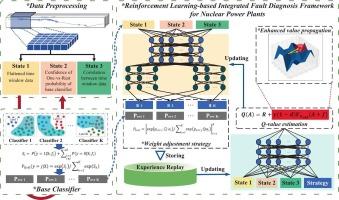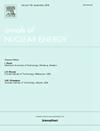Actor-Critic deep reinforcement learning-based integrated fault diagnosis method for nuclear power plants
IF 2.3
3区 工程技术
Q1 NUCLEAR SCIENCE & TECHNOLOGY
引用次数: 0
Abstract
Although the international community has carried out a lot of research work on fault diagnosis, the nonlinear and high coupling characteristics of nuclear reactors and complex transient conditions put forward higher requirements for fault diagnosis algorithms. In this paper, an integrated method based on reinforcement learning is proposed, in which the base models of the integrated model are pre-trained machine learning units, and Twin delayed deep deterministic policy gradient is used to learn dynamic weight update strategies to adjust the diagnosis probability of the base models based on One-vs-Rest method. An idea of enhanced value propagation is designed and applied to the reinforcement learning. Experimental results show that the fault diagnosis integrated framework based on reinforcement learning has higher accuracy and lower misdiagnosis rate, the enhanced value propagation is proved to be able to obtain higher fault diagnosis accuracy with faster convergence and stronger optimization ability.

基于Actor-Critic深度强化学习的核电厂综合故障诊断方法
尽管国际上在故障诊断方面开展了大量的研究工作,但核反应堆的非线性和高耦合特性以及复杂的暂态条件对故障诊断算法提出了更高的要求。本文提出了一种基于强化学习的集成方法,该方法将集成模型的基本模型作为预训练的机器学习单元,利用Twin延迟深度确定性策略梯度学习基于One-vs-Rest方法的动态权值更新策略来调整基本模型的诊断概率。提出了一种增强值传播的思想,并将其应用于强化学习中。实验结果表明,基于强化学习的故障诊断集成框架具有较高的准确率和较低的误诊率,增强的值传播能够以更快的收敛速度和更强的优化能力获得较高的故障诊断精度。
本文章由计算机程序翻译,如有差异,请以英文原文为准。
求助全文
约1分钟内获得全文
求助全文
来源期刊

Annals of Nuclear Energy
工程技术-核科学技术
CiteScore
4.30
自引率
21.10%
发文量
632
审稿时长
7.3 months
期刊介绍:
Annals of Nuclear Energy provides an international medium for the communication of original research, ideas and developments in all areas of the field of nuclear energy science and technology. Its scope embraces nuclear fuel reserves, fuel cycles and cost, materials, processing, system and component technology (fission only), design and optimization, direct conversion of nuclear energy sources, environmental control, reactor physics, heat transfer and fluid dynamics, structural analysis, fuel management, future developments, nuclear fuel and safety, nuclear aerosol, neutron physics, computer technology (both software and hardware), risk assessment, radioactive waste disposal and reactor thermal hydraulics. Papers submitted to Annals need to demonstrate a clear link to nuclear power generation/nuclear engineering. Papers which deal with pure nuclear physics, pure health physics, imaging, or attenuation and shielding properties of concretes and various geological materials are not within the scope of the journal. Also, papers that deal with policy or economics are not within the scope of the journal.
 求助内容:
求助内容: 应助结果提醒方式:
应助结果提醒方式:


